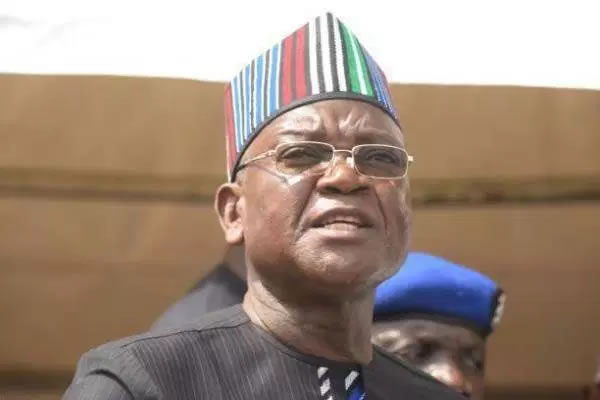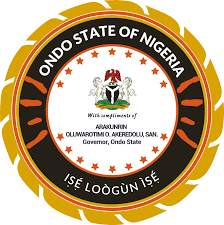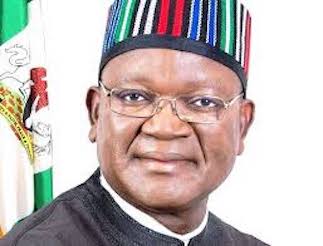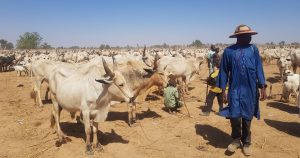Agriculture
Grazing Reserves: Presidency Turning Nigeria to Cow Republic-Ortom

In response to the Federal Government’s plan to establish grazing reserves in 25 states of the Federation, Benue State Governor, Samuel Ortom has described the move as an attempt to turn Nigeria into a “Cow Republic”.
In a statement by his Chief Press Secretary, Terver Akase, Ortom said he was “shocked and disappointed” with attempt by the Federal Government to establish 368 grazing sites across the country spread in 25 states.
Although the Federal Government is yet to name the states, Ortom said the idea was “unacceptable” adding Benue had no land for grazing reserves.
The statement reads in full:
“We were shocked and disappointed to read a statement from the Presidency indicating that President Muhammadu Buhari has approved recommendations of a committee to review “with dispatch,” 368 grazing sites across 25 states in the country, “to determine the levels of encroachment.
”
“In a country where insecurity has reached an all-time high with hundreds being killed by armed herdsmen, bandits and other terrorists, the Presidency is only bordered about animals and their safety and is deploying all machinery and arsenals of government to impose grazing reserves and cattle routes on Nigerians. This is unacceptable!
“The Buhari administration has turned a blind eye to the unimaginable levels of encroachment on lands belonging to Nigerians by cattle. Mr President has never come out even once to condemn activities of herdsmen and the attacks they visit on innocent people. The only time the President is heard speaking about atrocities of the herders is when he defends them.
“It is now clear that the Presidency wants to plunge the country into avoidable crisis. Otherwise, what is the justification for President Buhari’s insistence that grazing reserves be established across the country when Nigerians have openly kicked against the policy and have embraced ranching in place of open grazing?
“Millions of Nigerians have been displaced following attacks by armed herders and are currently suffering in IDP camps. Benue State for instance has over 1.5 million displaced people with thousands living in camps and many more forced to flee their ancestral lands to stay under dehumanizing conditions in open fields. The Buhari administration does not seem to be worried about the food crisis already ravaging the country. Farmers have been chased into IDP camps by herders and children are dying of starvation in addition to being denied education, yet what is more important to their President is the well being of cows.
“We expected the pitiable condition of the displaced people to be the preoccupation of the President whom they voted in 2015 and 2019. It is unfortunate that the people’s genuine show of love, trust and votes for Mr President are being rewarded with hate, cruelty and dictatorial policies aimed at grabbing their lands to donate to herders and cows.
“We challenge the Presidency to name what it has done to alleviate the plight of those displaced by herdsmen in Benue and other states since 2018.
What is the difference between the Buhari administration’s approach to insecurity and the Taliban agenda in Afghanistan? It is now evident that the government at the centre prioritizes the welfare of cattle over human beings and is bent on taking Nigeria back to the precolonial era with some snippets of a society where in the words of Thomas Hobbes, life has become ‘solitary, poor, nasty, brutish, and short’. The country has been turned to a cow republic by the present administration and the basic principles of equality, justice, fairness and equity which engender peace and suppress anarchy are non-existent.
“President Buhari has refused to prove wrong, those who accuse him of being a Fulani President. He has instead proven that he indeed belongs to somebody. But Buhari is not the first Fulani man to be President of this country. Nigeria had Presidents Shehu Shagari and Umaru Yar’Adua who were also of Fulani ethnicity; but were Presidents for all Nigerians and treated citizens of this country fairly and equitably.
“Our country has never been more divided on ethnic lines and sentiments as it is under President Buhari who was thought to be the most prepared to lead the country at this time. Under President Shagari and President Yar’Adua, Nigerians were not chided by a horde of presidential spokesmen and social media hirelings for simply expressing their views on government policies.
“Perhaps Mr President is not aware that most of the northern states, including his home state Katsina and the entire southern states have unanimously rejected open grazing of livestock and approved ranching. The Presidency is therefore whipping a dead horse on the issue of grazing reserves. It is hypocritical for the Presidency to support and fund ranching in Katsina State and turn round to impose grazing reserves on other states.
“Those saddled with the duty of advising Mr President have apparently failed in their responsibility. They ought to have told the President that though grazing reserves existed in some parts of the country before independence, there have been several reviews and laws which, in addition to the years of social and infrastructural development as well as population growth, have superceded and rendered the reserves null and void. Additionally, the Land Use Act provides that Governors are the custodians of all lands in their states.
“The Federal Government has no constitutional right to appropriate lands for itself or anyone else for that matter without the approval of State Governors. Nigeria is practicing democracy; not despotism or feudalism. The President is obligated to listen to the yearnings of the people and lead according to the constitution. Leaders are elected to solve problems, not create more problems for the people.
“Nigeria is grappling with numerous security and economic challenges that should ordinarily worry the President. The Federal Government introduced the National Livestock Transformation Plan, NLTP and Nigerians accepted the policy. Why has the Buhari administration dumped the programme and opted for grazing reserves and cattle routes? That is the question agitating the minds of discerning Nigerians who suspect foul play.
“The Federal Government’s posture has emboldened armed Fulani herdsmen who go about maiming and killing innocent Nigerians. That the government has turned deaf ears to calls for the licensing of responsible Nigerians to own sophisticated weapons is another pointer to a hidden motive.
“We also read the President’s comments yesterday at the National Security Council meeting where he threatened to sack Security Chiefs for what he termed failure to tackle insecurity in the country. Why won’t the Security Chiefs fail when the body language of the Commander-in-Chief points to a clan of sacred cows who must be spared and given protection to perpetuate evil? How will the Security Chiefs succeed when their formations are not well funded and the troops are left to confront terrorists who have superior weapons? Why will the military commanders be decisive when those who kill their personnel and other Nigerians are given preferential treatment on the pretense of “repentance”? We hope that Mr President was misquoted. But if indeed he made the statement attributed to him, he was not being fair to the security agencies.
“President Buhari’s spokesman, Femi Adesina once asked Nigerians to choose between holding onto their lands or losing their lives. What is happening now is confirmation of that threat from the Presidency. They introduced Cattle Colonies, Ruga and National Water Resources Bill but Nigerians rejected all the policies. The latest push for grazing reserves and cattle routes is surely the final onslaught against majority of Nigerians who must be deprived of their God-given lands to accommodate foreign herdsmen moving into the country for the occupation agenda.
“Governor Samuel Ortom has repeatedly stated that there is no land for grazing reserves or cattle routes in Benue State. Though the Federal Government craftily concealed the names of the states where Mr President has ordered that grazing reserves be foisted on the people, we wish to categorically state that no part of Benue will be allocated for grazing reserves or cattle routes! The stand of the Governor is not personal; it is the collective decision of Benue people. There is no gazetted land or cattle route in Benue State. Our state should be counted out of the proposed grazing reserves programme.
“If President Buhari must actualize his cattle agenda in Benue State, he should be ready to kill all of us! We know that grazing reserves and cattle routes are the only project that the President has for Nigeria, but Benue is not interested in such a project.
“We are equally disappointed with members of the committee, which recommended that grazing reserves be established in parts of the country. They are the real enemies of Nigeria. Theirs is hypocrisy of the highest order. Members of the committee should know that posterity will judge everyone according to their deeds here on earth. Above all, there is God.
Agriculture
Nigeria Misses out on $180bn Global Cassava Processing Market

By Torough David , Abuja
With a current production capacity of 62.69 million and holding the position of the largest producer of cassava in the world, Nigeria is missing out of the $180 billion global cassava processing market.
The country’s cassava value chain, although hampered by local consumption, has the potential to drive economic growth and attract foreign investments.
Stakeholders in the value chain say that with improved yield, provision of credits for farmers and accessibility of lands, the country could tap into the $180 billion processed market.
The conversion of fermented cassava into high-quality products—such as High-Quality Cassava Flour (HQCF), cassava starch, bioethanol, and sweeteners (glucose and sorbitol) — could aid in cushioning forex scarcity in Nigeria.
“Nigeria, as the world’s largest cassava producer, generates approximately 18 percent of global cassava output but captures merely 2 percent of the crop’s vast $180 billion global processing market,” said Olayinka David-West, dean of Lagos Business School, Pan-Atlantic University.
David-West reiterated that despite cassava’s substantial production scale—feeding millions daily through staple foods like Garri and fufu and sustaining the livelihoods of approximately 14 million smallholder farmers—over 90 percent of Nigeria’s cassava harvest remains relegated to low-value and food-grade uses.
“This significantly constrains farmer incomes and limits broader economic impact,” she added.
Escalating global demand for industrial cassava products offers Nigeria a significant market opportunity to expand beyond traditional uses, she says.
According to the International Trade Centre, global cassava derivative exports have grown over 20 percent annually in recent years, underscoring robust international demand for industrial cassava products.
Meanwhile, Olayinka Majekodunmi, partner at Boston Consulting Group, emphasised that cassava in its HQCF form serves as a strategic alternative to imported wheat flour, essential for Nigeria’s bakery and snack sectors.
This is imperative as Nigeria imports 98 percent of its wheat needs, amounting to an average of $2 billion annually.
“HQCF presents substantial import substitution potential, potentially unlocking a $600 million market. Currently, utilisation remains low at 5 percent, yet scaling to 20 percent is achievable, given existing facilities are underutilised by approximately 50 percent,” he said.
On the investment opportunities in cassava starch, he explained that it is commonly used in paper, textile and pharmaceutical industries.
“Domestic production significantly lags demand, which grows at approximately 5.2 percent annually, representing a substantial market gap. Capturing this gap could realistically secure an additional $485 million, bolstering local manufacturing capabilities.”
But to conveniently tap into this pool of wealth, stakeholders argue that production must first of all be ramped up.
How production can be bolstered
Although current cassava yields average 6 tons per hectare compared to a global benchmark of 25 tons per hectare. The Food and Agriculture Organisation (FAO) estimates that bridging this yield gap could boost production by an additional 11 million metric tons.
“Key investments are needed in superior, disease-resistant varieties, mechanization, agronomic training, and post-harvest handling improvements to reduce losses,” David-West said.
She said cassava processing costs in Nigeria remain high, often quadrupling in off-grid areas due to unreliable power supply.
Hence, most processing facilities operate 50 percent below capacity, further lowering efficiency.
According to her, this calls for strategic investments in modern processing technologies, renewable energy infrastructure, and agro-industrial clusters.
Echoing her words, Majekodunmi said access to affordable finance remains a major challenge. He urged the development of tailored financial instruments such as patient capital and concessional loans, coupled with securing long-term off-take agreements, which will mitigate risks.
Stakeholders believe that the country has what it takes to drive value addition in the sector, but it requires intentional efforts to bolster yield per hectare and production capacity.
Key industrial derivatives
Among cassava derivatives, four key products present immediate high-growth opportunities, collectively representing a market of approximately $2 billion:
High-Quality Cassava Flour
HQCF serves as a strategic alternative to imported wheat flour, essential for Nigeria’s bakery and snack sectors.
With Nigeria importing roughly 98 percent of its wheat consumption—valued at approximately $2 billion annually—HQCF presents substantial import substitution potential, potentially unlocking a $600 million market.
Currently, utilization remains low at 5 percent, yet scaling to 20 percent is achievable, given existing facilities are underutilized by approximately 50 percent.
Industrial starch: Widely used in sectors such as paper, textiles, pharmaceuticals, adhesives, and food additives, local cassava starch offers significant competitive advantages.
Domestic production significantly lags demand, which grows at approximately 5.2 percent annually, representing a substantial market gap.
Capturing this gap could realistically secure an additional $485 million, bolstering local manufacturing capabilities.
Sweeteners (Glucose and Sorbitol)
Nigeria’s rapidly growing sweetener market (18 percent annual growth) remains predominantly import-dependent (95 percent imported), driving up costs for manufacturers.
Cassava-based sweeteners offer a cost-effective alternative, priced considerably lower than imported sucrose.
Companies such as Coca-Cola have indicated strong interest in sourcing locally, underscoring this segment’s immediate scalability and representing a clear $500 million market opportunity.
Bioethanol
Nigeria imports about 26 percent of its ethanol for beverages, pharmaceuticals, and fuel blending, exposing the economy to price volatility.
Cassava-based bioethanol offers significant economic advantages, costing approximately $0.06 per liter less than imported ethanol.
Given Nigeria’s existing ethanol market valued at $420 million, substantial expansion opportunities exist for investors to scale local production.
Agriculture
Don Pushes for Sustainable Environmental Practices

A lecturer at Ahmadu Bello University (ABU), Zaria, Prof. Wisdom Japhet has called on Nigerians to adopt practices that protect the environment and promote sustainable development.
Japhet made the call on Tuesday in Abuja on the sidelines of a training workshop on environmental standards.
The workshop was organized by the Sustainable Procurement Environmental and Social Standards Enhancement Centre of Excellence (SPESSECE ABU), in collaboration with the World Bank.
Japhet, who also serves as the Director of SPESSECE ABU, emphasised the importance of environmental awareness in developmental planning.
He said the goal of the training was to instill in participants the knowledge and capacity to integrate environmental considerations into development projects.
“The aim is to build capacity in the area of sustainable development.
“Every developmental activity must be sustainable. We are training participants to consider environmental impacts and provide consultancy for projects that may have negative consequences on the environment,” he said.
He added that certification in environmental management was becoming increasingly essential, as global standards now prioritise it.
“It’s very important for Nigerians to be both environmentally and socially aware. When you harm the environment, you harm people by extension,” Japhet stated.
He called on stakeholders in both public and private sectors to participate in the SPESSECE training and become certified.
According to him, the programme also equips participants with tools to anticipate environmental issues in projects, including planning for mitigation strategies.
“Most developmental activities have some environmental impact, and if those are not addressed, they cannot be considered sustainable. We must develop, but not at the expense of the environment,” he said.
On the issue of noise pollution, Japhet noted that everyone had a role to play in protecting the environment.
Also speaking, Dr Soala Martyns-Yellowe, an environmental practitioner, said that the SPESSECE project aimed to improve Nigeria’s capacity to manage environmental, social, and procurement standards.
He said the initiative was crucial as Nigeria strived to meet its development goals.
“The idea is to mainstream environmental and social frameworks into national systems,” he said.
Martyns-Yellowe urged relevant agencies to intensify awareness campaigns about the dangers of noise pollution and enforce existing regulations to mitigate its effects.
| ReplyReply allForwardAdd reaction |
Agriculture
Ondo to Partner FUTA on Wildlife Conservation

The Ondo State Government said it will partner with the Federal University of Technology, Akure (FUTA), on the restoration and development of OSSE River Park to international standards for eco-tourists attraction.
Permanent Secretary, Ministry of Agriculture and Forestry, Segun Odusanya stated this during a meeting with the Department of Forestry and Wood Technology and Department of Ecotourism and Wildlife Management of the institution.
Odusanya, who said that there was a need to partner national and international organisations, explained that the state government welcomed technical and logistic support to enhance the park’s restoration and conservation.
“The OSSE River Park is the state’s only conservation park which provides a habitat for wild animals, but it requires attention due to human activities,” he said.
Also, Mr Olushola Ibosiola, Director of Wildlife Conservation, Parks, and Ecotourism in the ministry, emphasised the importance of wildlife conservation and ecotourism, saying that the park covered 285.79 km²
According to him, the benefits of ecotourism include revenue generation, economic incentives, awareness, and research support.
Ibosiola, however, acknowledged the challenges of ensuring sustainable practices and balancing economic benefits with conservation goals.
Prof. Oluseyi Fabiyi and Prof. Adekunle Ogunjinmi, from the two departments in FUTA, expressed their willingness to collaborate with the government to harness the park’s potential.
The duo said the international bodies were willing to provide support for wildlife conservation and ecotourism development.
They promised to schedule a visit to assess the park’s condition and determine the level of intervention required.



















